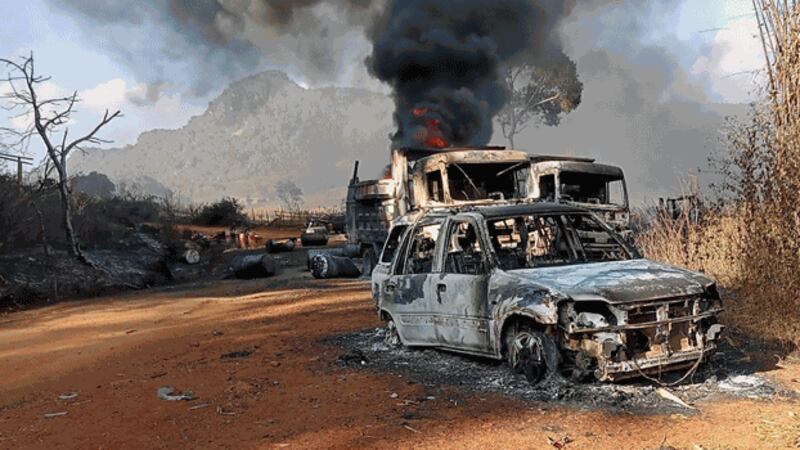Intense clashes between local ethnic militias and junta forces that began in the eastern Myanmar town of Demoso have spread to the Kayah state capital, a year after the military seized power from the democratically elected government of former leader Aung San Suu Kyi, state residents said.
Demoso was the site of the first clashes between junta forces and civilian-led anti-coup protests a few months after the coup on Feb. 1, 2021. The fighting has since spread to f Hpruso township and now to the state capital Loikaw, which is about 11 miles north of Demoso.
The fighting has forced nearly 180,000 people — more than half of Kayah’s population — to flee to safety, according to the Karenni Social Network. Nearly 200 civilians have been killed there since the coup, according to the Karenni Civil Society Network.
There is now daily fighting between the military and the joint forces of the Karenni Nationalities Defense Force (KNDF) and the Karenni Army in Loikaw. Myanmar soldiers have been shelling the town every day since Jan. 6, destroying homes and forcing residents to flee.
Kayah is Myanmar’s smallest state and its least developed region, largely inaccessible to foreigners. The intense attacks have prompted the Karenni National Progressive Party, along with the Karen National Union and the Chin National Front, to issue a joint request to the United Nations and the international community on Jan. 20 to establish safe demilitarized zones for civilians because junta forces are launching daily air strikes.
Residents of Demoso began staging anti-junta protests amid a nationwide eruption of initially peaceful demonstrations following the coup. Armed resistance began on May 21 when clashes broke out between the military and the combined forces of the KNDF and local People’s Defense Force (PDF) in Demoso’s Daw Ngan Khar ward.
Local civil society groups say about 70,000 people in Demoso township have fled the fighting and have been unable to return to their homes.
Morrow, who fled his home in Demoso, said the war-torn township is now deserted and lifeless.
“Since the war started last May after the coup, there has been no traffic in the famous Ngwe Daung Dam area,” he said, referring to the scenic man-made Ngwe Daung Dam, a tourist attraction about 10 miles south of Loikaw in Demoso township.
“There have been no tourists. Many people used to go fishing in the Ngwe Daung Dam, and the whole place was busy and so lively. Now you won’t see anyone fishing there,” he said.
During the early days of the conflict, the dam area and Demoso turned into a battle ground littered with corpses after heavy artillery fire from the junta’s 427th Light Infantry Brigade and 102nd Infantry Battalion based near Ngwe Daung village hit both homes and churches where people took refuge.

'We are paying the price'
Gabriela, a vendor in Demoso’s central market who fled the town several months ago, said that even though her house was not destroyed by fighting it still required a significant amount of effort to make habitable again after months of disuse.
“I went back as soon as people said the coast was clear,” she told RFA. “When I got there I found the whole house covered with vines and bushes.
“I then looked around other people’s houses to see how much destruction there was,” she said. “Some people’s houses were damaged quite badly."
Gabriela also said that her stall in the market, previously one of the busiest sites in Demoso, was destroyed by artillery fire. The market used to be full of shoppers when it was open on Mondays, Wednesdays and Saturdays, but now is it like a cemetery, she said.
Amid the turmoil, junta forces massacred 35 civilians, including children, in Moso village near Demoso on Dec. 24, 2021.
In response, junta spokesman Maj. Gen. Zaw Min Tun, said the soldiers followed the rules while carrying out the military operation.
“PDFs in civilian clothes attacked our units, taking cover in the buildings in the village,” he said. “When they were successful, they claimed credit. When they failed, they said civilians were killed. These are common allegations from them.
“We follow the rules and regulations,” he said. “They are the ones who are the perpetrators, and they claim that every death is a civilian death.”
But state residents, most of whom are from the mainly Christian Karenni ethnic minority group, have accused the military council of committing crimes against civilians there.
But Theik, a member of the KNDF, a network of civilian resistance fighters, Karenni organizations, and armed groups, said the coup and its violent aftermath have caused great suffering among the people of Kayah state and elsewhere in Myanmar.
“We are paying the price for their actions,” he said. “It is not only in Kayah state where homes and villages were destroyed; it is happening in other states across the country. We have sympathy for all the brethren, and the main culprit is the junta.”
“Once the military council is overthrown, we will have the kind of federal union we want and the freedom we want,” he said.
Reported by RFA’s Myanmar Service. Translated by Khin Maung Nyane. Written in English by Roseanne Gerin.
